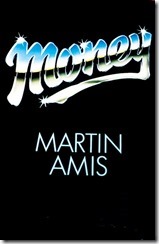 John Self is a successful director of advertising commercials, getting ready to direct his first feature film. He has a seemingly limitless budget for this film and is promised a huge salary. The Englishman travels from his London home to New York and back multiple times, consuming physical pleasures along the way.
John Self is a successful director of advertising commercials, getting ready to direct his first feature film. He has a seemingly limitless budget for this film and is promised a huge salary. The Englishman travels from his London home to New York and back multiple times, consuming physical pleasures along the way.
Martin Amis's novel Money -sometimes titled Money: A Suicide Note- tells Self's story.
John leads a life of hedonism and debauchery, gliding from booze to porn to drugs to prostitutes to bar fights to masturbation to his girlfriend. And, despite his recent directing contract, he has trouble with money.
Most of his problems are Self-inflicted. He is an overweight drunk and a sex addict and a misogynist and is sometimes violent and he is extremely careless with money. Here are some examples of John's philosophy:
"The first thing I wonder about a woman is: Will I f*ck it? Similarly, the first thing I wonder about a man is: Will I fight it?"
"I disclaim responsibility for many of my thoughts. They don't come from me. They come from these squatters and hobos who hang out in my head"
But John is also a victim.
He suffers from a severe toothache and from tinnitus. When he came into money, his father presented him with a bill for the cost of his upbringing; his gold-digging girlfriend is unfaithful and is spending his savings; each of the film's actors pressures him to radically alter the movie's script in order to satisfy their ego; Self has a mysterious enemy, who calls him to harass and threaten him and seems to know everything about his life. And there are other forces conspiring against Self of which he is unaware until the end of the novel.
Amis does a good job building a character that is at once abhorrent and sympathetic. John Self is clever, but unlikeable. His first-person narrative is the stream of consciousness made popular by writers like Henry Miller, Vladimir Nabokov, Malcolm Lowry, and Jack Kerouak. And Self's path to self-destruction is not unlike the narrators of "Tropic of Cancer", "Lolita", "Under the Volcano", and "On the Road".
And the author's ability to take a complex, unlikely story filled with hyperbole and make it seem plausible is admirable, as is the humor with which he tells this story. Amis even inserts himself into the book, as the arrogant writer that John approaches to rewrite his screenplay. He may add himself as a character to convince the reader that he is not the vulgar anti-hero narrator.
It helped that I listened to the audiobook, which was expertly narrated by Graeme Malcom, who reminds me very much of Michael Caine
Money is a commentary on the excess consumerism of the 1980s; but it will remain relevant as long as humans value money over other aspects of their life.